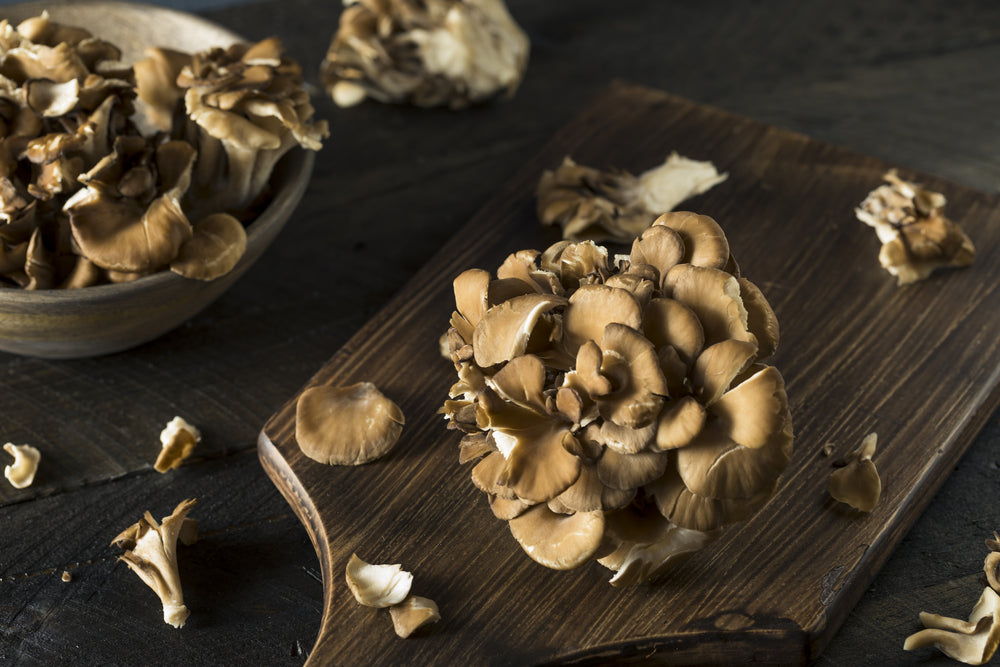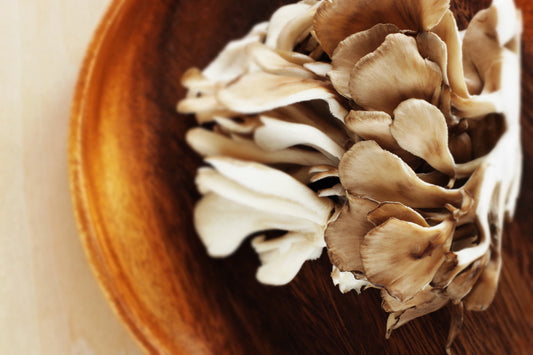The maitake mushroom, also known as “hen-of-the-woods,” has become a renowned culinary mushroom species known for its powerful health-supporting properties.‡ Its perceived benefits have made this species one of the most popular mushrooms cultivated for supplementation. But you might be wondering; where did maitake originate? Why is this species so special?
This article will explore the historical use of maitake (hen-of-the-woods), its many benefits and how to incorporate it into your daily health routine.
The Historical Use of Maitake (Hen-of-the-Woods)
Grifola Frondosa, also known as maitake, is an edible fungus native to China, northeastern Japan, and North America. In the wild, maitake can be found on the forest floor at the base of oak, maple, or elm trees, but is modernly cultivated indoors.
While many stories differ in the way maitake received its name “the dancing mushroom” many sources report that maitake was a rare and treasured species that many Japanese healers sought after for its powerful medicinal properties. When found growing on the forest floor, everyone would dance and rejoice at their amazing discovery. This species was also easy to spot with its overlapping feathered, hen-like appearance which also makes this species known as “hen-of-the-woods”.
Maitake gained its popularity as a medicinal mushroom for its strong ability to support immune health and for its immondulatory benefits.‡ This is due to the amount of beta-glucans and antioxidants found within this species. When fully grown, maitake can weigh up to 100 pounds, making it one of the largest mushroom species. Another characteristic to appreciate about maitake is that it is a soft polypore mushroom; it’s texture makes it easy to cook with.
Whether this mushroom is cooked in a meal or processed into a powdered or extracted form, maitake is one species that offers a host of benefits to help support health and wellness.‡
Maitake (Hen-of-the-Woods) Nutritional Facts
Much like many other mushrooms, maitake (hen-of-the-woods) is low in calories and rich in protein. It offers a great addition to any meal for its many beneficial nutritional properties. Maitake is composed of:
- Beta-glucans: Beta-glucans are polysaccharides that occur naturally in the fungal cell walls of many functional mushrooms including maitake. Beta-glucans help activate and potentiate the immune system to provide support for your body’s natural functions.‡
- Bioactive compounds: Maitake is made up of a variety of beneficial bioactive compounds including Niacin, Riboflavin, and vitamin D.
- Niacin is a form of vitamin B3 that is essential in supporting healthy cholesterol levels.‡
- Riboflavin is vitamin B2 and plays an important role in the breakdown of carbohydrates, proteins, and fats to help support energy production in the body.‡
- Maitake is known to have high contents of vitamin D which offers a range of benefits in supporting immune, heart, and bone health.‡ Contents of vitamin D found in maitake will vary based on where the species was grown.
- Phosphorus: Phosphorus is a mineral found in bones and teeth and is beneficial in the maintenance, growth, and repair of cells, tissues and also helps in the formation of adenosine triphosphate (ATP), a molecule the body uses to store energy.‡
- Potassium: Maitake offers a great source of potassium, a mineral that supports nerve and kidney function, heart health, and blood sugar levels.‡
The nutrients found in maitake are plentiful, but you might be wondering if this species can offer the same benefits when cultivated indoors? Are there risks to mushrooms grown in the wild?
Risks of Wild Grown Maitake (Hen-of-the-Woods) Mushroom
Maitake is perfectly safe to consume when grown outdoors, however different variables can affect any species of mushroom grown in the wild.
Weather Conditions
Temperature and lighting changes can have a large impact on mycelium growth of fungi. To be abundantly fruitful, mushrooms should be grown at a steady temperature (particular to the species) which can be unpredictable in the wild.
Contamination
While we all love mushrooms, so do creatures in the wild. Insects mostly will partake in eating mushrooms which risks taking away nutritional factors. Not to mention the possible diseases insects and other animals carry that can contaminate mushrooms.
Mushrooms also absorb and accumulate many nutrients from their environment. One study found that upon reviewing certain mushroom species grown in a polluted outdoor ecosystem, the results showed a heavy metal concentration found in the mushrooms. The environmental factors that affect mushrooms can be toxic to those who consume them and cause serious health complications.
Benefits of Indoor-Grown Maitake
While once only grown in the wild, maitake is now commonly grown indoors. This method offers a safe and more reliable technique to obtain a nutritious and safe-to-consume product. When cultivated indoors, the growth process can be closely monitored and will be easier to maintain based on consistent temperature and environmental factors free of any toxins or threats that are typically found in the wild. Indoor-grown mushrooms can also go through a lengthy testing process to ensure the mushrooms are third-party tested and free of insects.
Om Mushroom Growth Process
Om Mushroom is committed to delivering excellence in product quality and food safety at every step of our growth process. Our certified organic mushrooms are grown in a controlled, clean cGMP (certified good manufacturing practices) facility. This process allows our mushrooms to be monitored by mycology experts to ensure safe growth free from environmental toxins, bugs, and pesticides.
We use filtered air and water and pure organic oats as a growth medium. Because many mushrooms grow on wood in the wild, the oats are kept intact with the hull, so the mushrooms have something challenging to break down. By doing this, the mushrooms excrete more enzymatic activity, resulting in a wide array of nutrients that are protected in our indoor, controlled environment.
Maitake Mushrooms at Om Mushroom
Upon growth, our mushrooms are harvested then heated to dehydrate them into a whole-food product. The dried mushrooms are then milled into powders creating a convenient way to add a mushroom species into your daily regimine. After an Om mushroom supplement has been through the entire process and powdered or encapsulated, it’s sent for third-party testing to ensure quality. This is where all mushroom supplements are tested for heavy metals and other contaminants to meet and exceed industry standards.
After thorough testing, our mushroom supplements are then ready for consumers, and we offer a variety of mushroom powder blends including maitake. Our maitake mushroom powder blend can offer support in healthy blood sugar levels, healthy weight control, and healthy digestion.‡ This incredible blend is also great support for your immune system.‡
When considering the long-standing history of maitake (hen-of-the-woods) mushrooms and the tremendous benefits offered, maitake is the perfect natural addition to your diet. And at Om Mushroom, we make it easy. Simply add one teaspoon of our organic maitake mushroom powder blend daily to coffee, smoothies, or a recipe of your choice to experience the amazing benefits.
[CTA]
‡These statements have not been evaluated by the Food and Drug Administration. Functional mushroom products are not intended to diagnose, treat, cure or prevent any disease.
[CTA guide]
[CTA brain]
[CTA featured-products]
[CTA related-articles]
[CTA newsletter-signup]
[CTA products handles="morning-energy-blend,om-turkey-tail,immune-drink-mix" button-label="Buy Now"]













